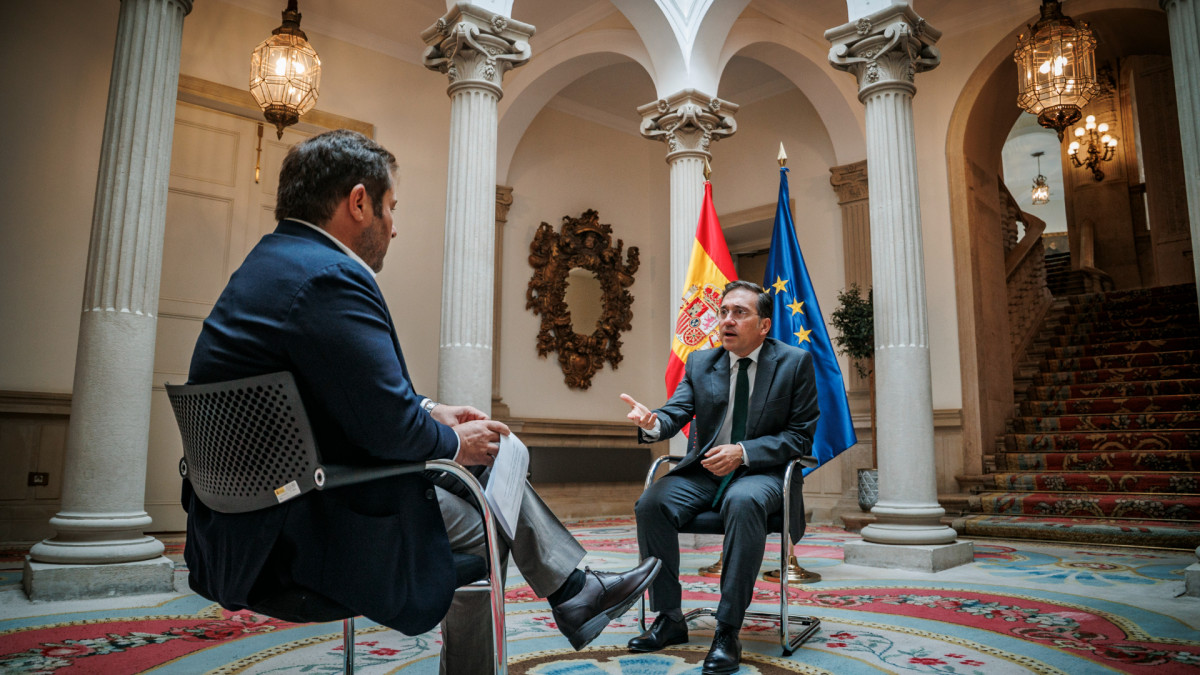The Viana Palace, official residence and representation venue of Foreign Affairs Minister José Manuel Albares (born 1972, Madrid), opens its doors to Agenda Pública. Marc López Plana, editor and director of the outlet, engages in a conversation with Minister Albares that touches on the main points of Spain’s foreign agenda. The socialist diplomat discusses the transformation of international affairs into national politics. He considers this trend logical, noting that “there is nothing more domestic than foreign policy,” although he believes it sometimes leads to perplexing moments: “One cannot understand where some of the criticism comes from, particularly from the Popular Party.“
Albares then offers a detailed review of Spain’s role as an international actor in recent years — from Ukraine and Palestine, where Spain maintains “a coherent position with its own identity,” to relations with Donald Trump’s United States and the global standing of the Spanish language. He also indirectly addressed the current debate on public perceptions of transatlantic relations: “There is a great gap between the self-interested perception of some […] and the reality of what our relationship with the United States truly is,” the minister states.
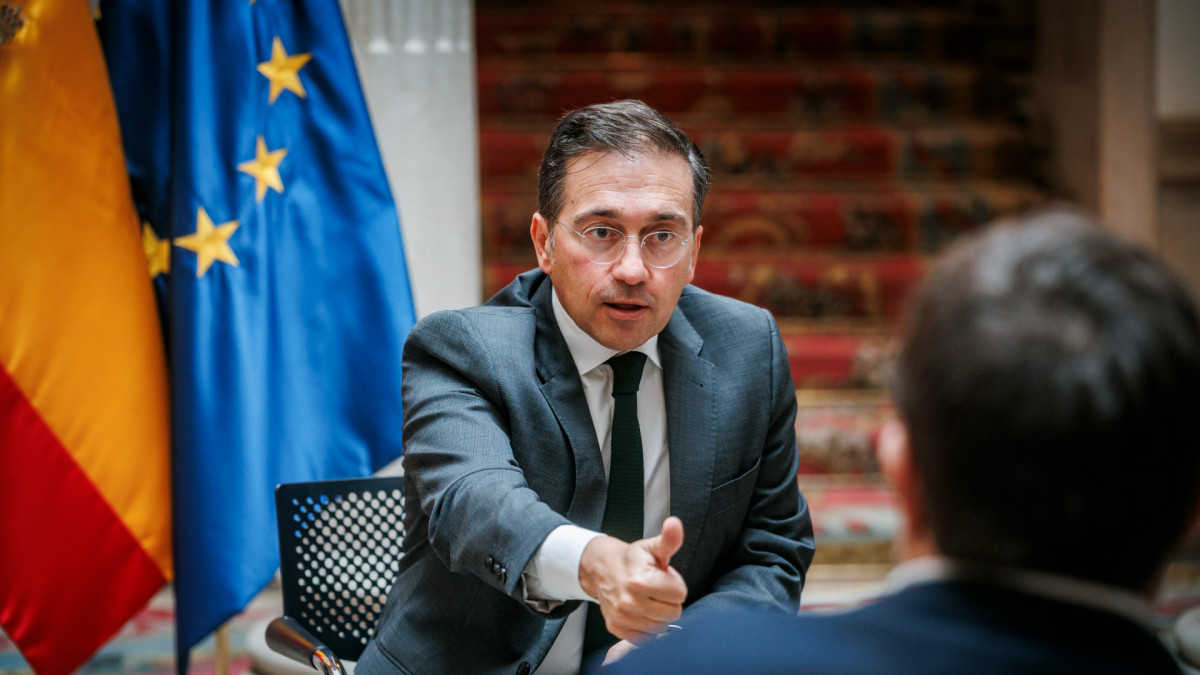
Minister José Manuel Albares welcomed Agenda Pública to the Viana Palace. Photo: Agenda Pública / Tania Sieira
Do you think that foreign policy has become a domestic policy issue? Venezuela, Mexico, Argentina, and now defense. Do you think foreign policy has become an arena where parties believe they can win votes?
That question has two vectors. One is obvious: we’re living in a moment, probably irreversible, in which nothing is more internal than foreign policy. Major decisions that affect the lives of our citizens are decided not only by the Government of Spain or the Parliament. Instead, we make decisions together with others — with our closest partners in Brussels, or at the WTO, or at non-formal venues like the “coalition of the willing”, or at the United Nations. Questions as fundamental as the currency we use, the vaccines that protect us, or our own security – whether from a hard military perspective or in a much broader sphere, as with climate change.
“Some political parties are using certain aspects of foreign policy as yet another tool to wear down the government”
At the same time, certain political parties are using specific aspects of foreign policy as another tool to wear down the government. Take the issue of Venezuela. There’s never been another government — none — that’s done so much for Venezuela and the Venezuelan people as ours has. This is clear, for example, if we look at the numbers of Venezuelan citizens who’ve received a special status, unique to them — from Venezuelans passing through Barajas airport to the family of Leopoldo López. Or very recently, the asylum status granted to Edmundo González. It’s hard to understand the criticism coming from the Partido Popular, among others. They should be supporting the government in this matter, but they’re trying to give the matter a completely different spin. Deep down, what they’re doing is not supporting Venezuelans — but they’re relying on Venezuelans to generate ‘wear and tear’. I’d offer that as an anecdote.
On the one hand, we’ll continue to implement the foreign policy that our citizens want, in line with their sentiments. On the other hand, I’m not going to stop reaching out to all parties. It’s already too late for certain issues, because some, like the Partido Popular, have told me “no” to recognition of the State of Palestine, or to the agreement on Gibraltar reached with the Commission. But then there are other [policies] we can still get together on. In the matter of Spain’s official languages in the European Union, my hand will always be outstretched. And there have been occasions when we’ve reached [an agreement], like with the law on cooperation, which for the first time established a historical societal demand that 0.7% of our gross national income be targeted at development aid
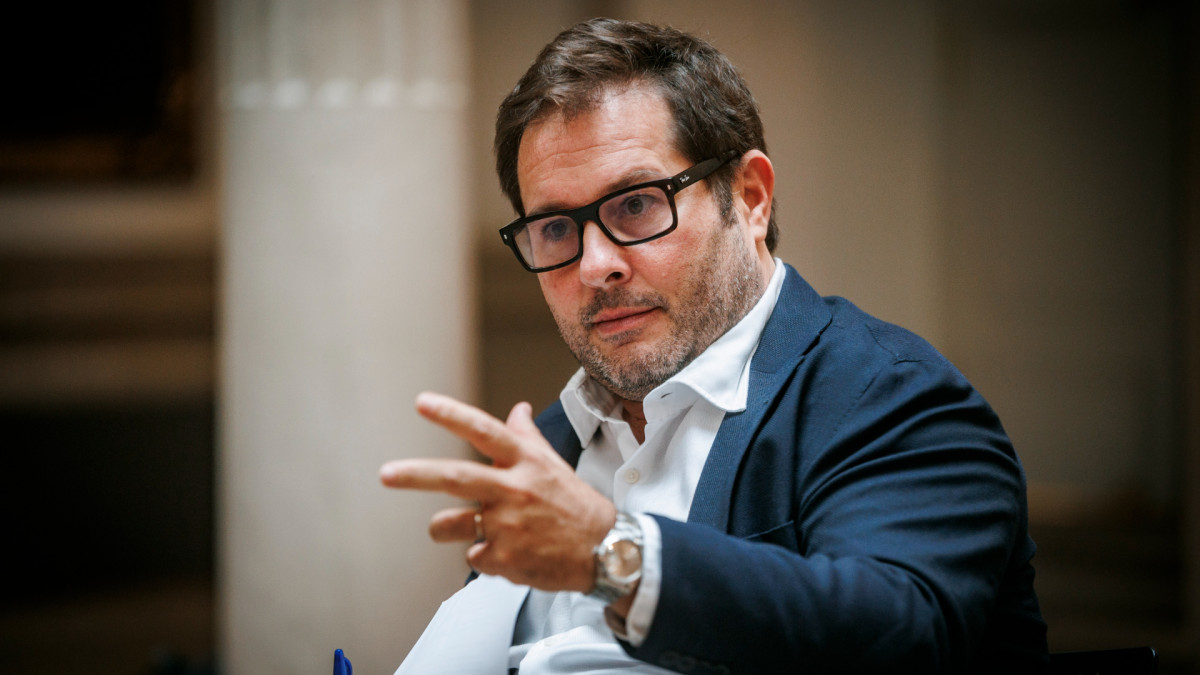
Marc López Plana asked the Foreign Affairs Minister about achieving greater unity in foreign policy. Photo: Agenda Pública / Tania Sieira
Don’t you feel that this could weaken Spain’s position abroad? Greater unity in this area could give us more strength.
In the years that I’ve been Minister of Foreign Affairs, I haven’t seen any weakening. At the moment, Spain has for the first time in its democracy a global foreign policy that’s heard in Washington, in Beijing, in Brussels. It’s coherent and says exactly the same in Ukraine as in Gaza; and it has its own identity, based on the interests and values of the Spanish people.
“We have led the wave of recognition of the State of Palestine. Moreover, we were among the first to say that we would support Ukraine for as long as necessary”
We’ve faced international crises where we’ve been recognized as leaders. Clearly, the wave of recognizing Palestine as a state was led by us, though that principled position is also coherent with international law and with humanitarian rights in Gaza. Moreover, we were among the first to say that we would support Ukraine for as long as necessary in its struggle for sovereignty. That’s just two major crises at the moment. And we’ve managed to close the agreement on Gibraltar, moving toward the best possible relationship with our neighbors.
Everyone recognizes our position in favor of Official Development Assistance. There have never been, as there are now, so many Spaniards situated at such high levels: today we have the highest posting we’ve ever had in the Commission, our first vice-presidency [Teresa Ribera]. Also, the president of the European Investment Bank [Nadia Calviño], one assistant Secretary General of the United Nations [Pedro Manuel Moreno], and the NATO special representative for the Southern Neighborhood [Javier Colomina], to name a few of the most important bodies.
On the other hand, in a span of just four years, Spain has hosted all the major international events that a country can host: the presidency of the European Union, a NATO summit, a United Nations conference, next year’s Ibero-American Summit of Nations, and the Feminist Foreign Policy Conference. So the context hasn’t weakened us, but that doesn’t mean it doesn’t hurt me, as a Spaniard — and as Spain’s Minister of Foreign Affairs — that a party like the PP systematically wants to project negative images of Spain wherever it can, especially in the European Parliament. There, for example, the PP tries to raise controversies that should be debated at the national level. I’d like to have the Partido Popular involved in state foreign policy, and I insist: my hand will always be extended — although I know they’ll reject it, because they’ve never even wanted to meet with me in the European Parliament.
.jpg)
The minister highlighted that many Spaniards hold senior positions at the European and international levels. Photo: Agenda Pública / Tania Sieira
At Agenda Pública, we think a lot about how to understand the figure of Donald Trump, and it’s difficult for us. Why is he able to say that he’s achieved peace in Palestine, as he apparently plans to do eventually with Ukraine? Don’t you think people wonder why peace wasn’t achieved earlier, for instance by Biden?
Donald Trump is the President of the United States. He’s been democratically elected and, therefore, he has every right to express his views and set out the political and foreign policy line he favors for his country. In my opinion, there’s almost an obsession with analyzing his comments, dissecting both him and his psychology. In reality, the energy – at least what I invest as Spain’s Minister of Foreign Affairs – has to be put toward what we can do. What can we do as Spaniards? What can we do as Europeans? Not so much what others do.
It must be recognized that there’s genuine interest on the part of the U.S. President for achieving peace in Ukraine and Gaza. In Gaza, he has reached, with the other mediators, of course, an agreement — which we staged in Sharm el-Sheikh — to release all the living hostages, so that bodies can then be handed over, so hundreds of Palestinian detainees can be freed, and— this is still very incipient — so there will be some respite in Israel’s unjustifiable bombardment of Gaza, which will allow the entry of humanitarian aid.
We’re still a long way from peace, which isn’t simply a relaxation of war, or even the absence of war. Peace is much more. And in Ukraine, we don’t even have a ceasefire. That’s what we have to do. If the U.S. President puts all the diplomatic strength of the United States toward achieving peace, he’s welcome to do it, and we’ll join that dynamic. Of course, we need to contribute all we can on our side and make it clear what we mean by peace.
“Let us move toward a logic where everyone can live together in safety, including Israelis and Palestinians, who also have the same right to have a state”
For us, a just and proper peace in Ukraine is one that’s lasting – not a parenthesis between two wars – and that respects the sovereignty and territorial integrity of Ukraine. And in Gaza, in the Middle East, a just peace will set up a State of Palestine that can live as a good neighbour, and guarantee mutual security and prosperity with a state of Israel that’s recognized by all of the Arab League. Let’s move away from a logic where the only way for people to relate in the Middle East is through war. Let’s move toward a logic where everyone can live together in safety, including Israelis and Palestinians. Both peoples have that right, just as they have the right to statehood.
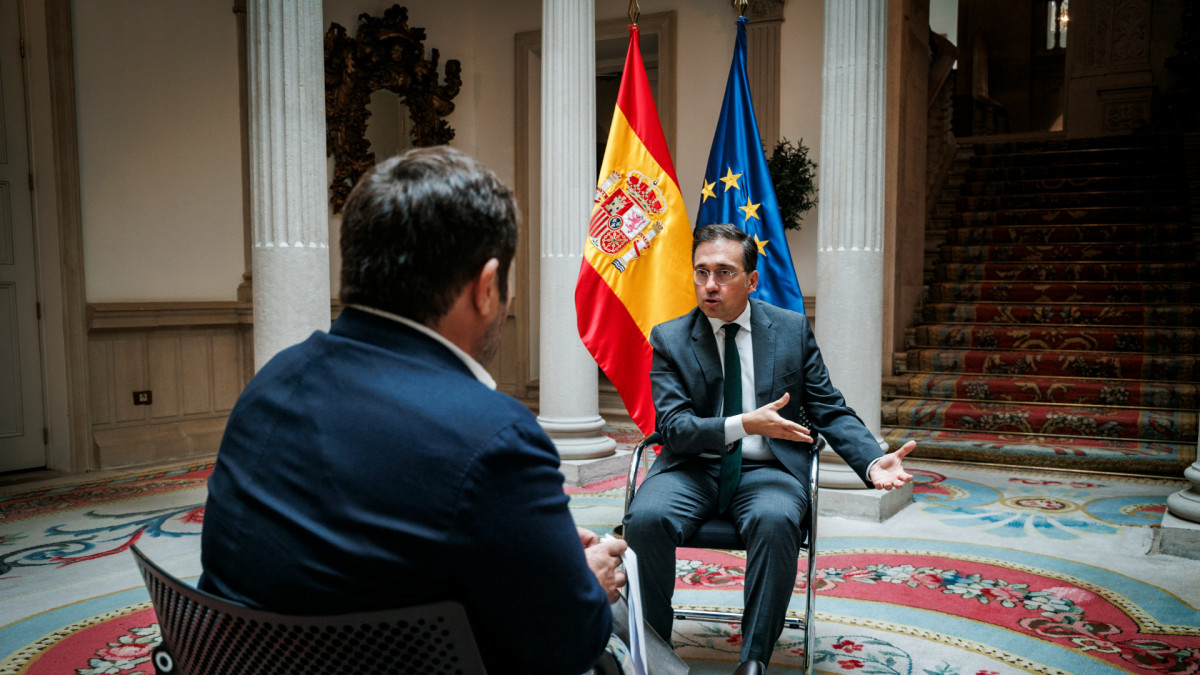
José Manuel Albares reiterated that peace in Gaza, like in Ukraine, must be built on solid principles. Photo: Agenda Pública / Tania Sieira
Beyond the noise in the media and on social networks, international politics and relations with the media are built on the basis of permanent dialogue.
Effectively. I’ve had a meeting with Marco Rubio at the State Department, and a working breakfast in that same building with the Secretary of the Treasury, Scott Bessent.
I’ll say that these were cordial and constructive meetings — as couldn’t be otherwise between two allies. The United States is a natural and historical ally of both Spain and Europe, because we share values. When we talk about transatlantic security, it goes beyond a mere concept, because we share a certain vision of the world with U.S. society. We share interests that have been very beneficial for both, like transatlantic trade. What we want is for that relationship to be maintained along the same lines.
When the President of the Government met with President Trump in Sharm el-Sheikh, everything was cordial. What doesn’t change and won’t change — because it’s an issue that outlasts administrations — is the natural relationship between American society and Europe’s societies, including ours.
What’s new, to my mind, is that some people — Spanish citizens — are interested in changing the perception. I insist, it’s a question of perception. The true facts are what they are: meetings at all levels, with a very dense agenda, and above all, a reality that’s shared by both societies. At the commercial as well as the security level. Together we advance positions within the organizations we belong to. Of course, there’s a wide distance between the self-interested perceptions of some — thanks to an internal intention to wear down the government — and the reality of our actual relationship with the United States.
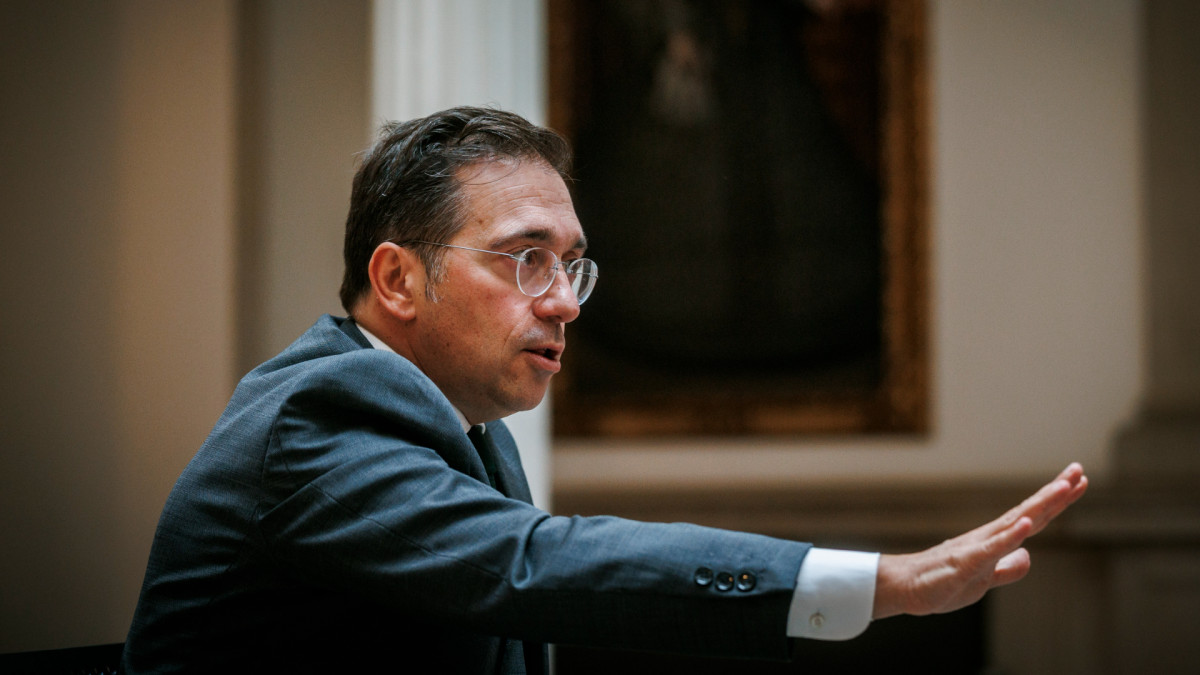
The cordial greeting between Donald Trump and Pedro Sánchez reflects the good relationship between the two countries, the minister explains. Photo: Agenda Pública / Tania Sieira
One final question, Mr. Minister. Do you think that we’re below where we could be in terms of Spain’s ability to influence the global public debate?
Spanish is its own language and an essential element for constructing how we Spaniards perceive ourselves — and how we project ourselves to the world. It’s a heritage given to us that’s absolutely irreplaceable. We’re fortunate to have a language in common with 600 million other people, making it the second language worldwide in terms of native speakers.
“Spanish is a language and an absolutely vital element on which to build how we perceive ourselves: it is a heritage that has been given to us and is utterly irreplaceable”
One of my first decisions as Minister of Foreign Affairs was to reinstitute the Secretariat of State for Ibero-America, and within that to create a General Directorate of Spanish in the World. One thing this has promoted is the signing of agreements in favor of Spanish – and we’ve had many agreements with other Spanish-speaking countries to push that forward. We want it to progress within international organizations, and in the framework of new technological challenges, and we’ve had a lot of success there.
The Spanish language is very well-placed on social networks and podcast platforms, being one of the top languages in frequency of use. But there are still big challenges: Spanish must be seen as a technological language, and a language of science, and it must be present in international organizations. The Spanish language is essential to our projection in the world.
First, because it goes very well with our current foreign policy around the world. There are very few truly global languages, and Spanish is one of them. Along with our history, this allows us to be part of a huge community on the other side of the Atlantic, and to adopt a global vision in a natural way.
I’m deeply convinced – and I’m saying this on our way to the Ibero-American Summit here in Madrid – that there’s an Ibero-American way of being and acting in the world. A way of understanding the world, and that can be put into practice through the Spanish language. We showed that recently, during the United Nations conference for development financing in Seville, where we maintained an Ibero-American position. And there’s another language shared [with the Americas], Portuguese, making us a bilingual community. Very recently, at a breakfast for Foreign Ministers in New York, we issued a joint resolution for Haiti, and we can repeat that approach.
For all those reasons, it’s absolutely vital – and one of the big priorities of this ministry – to promote Spanish itself, also promoting international actions conducted in Spanish and by Spanish-speakers worldwide.
Thanks a lot, Mr. Albares
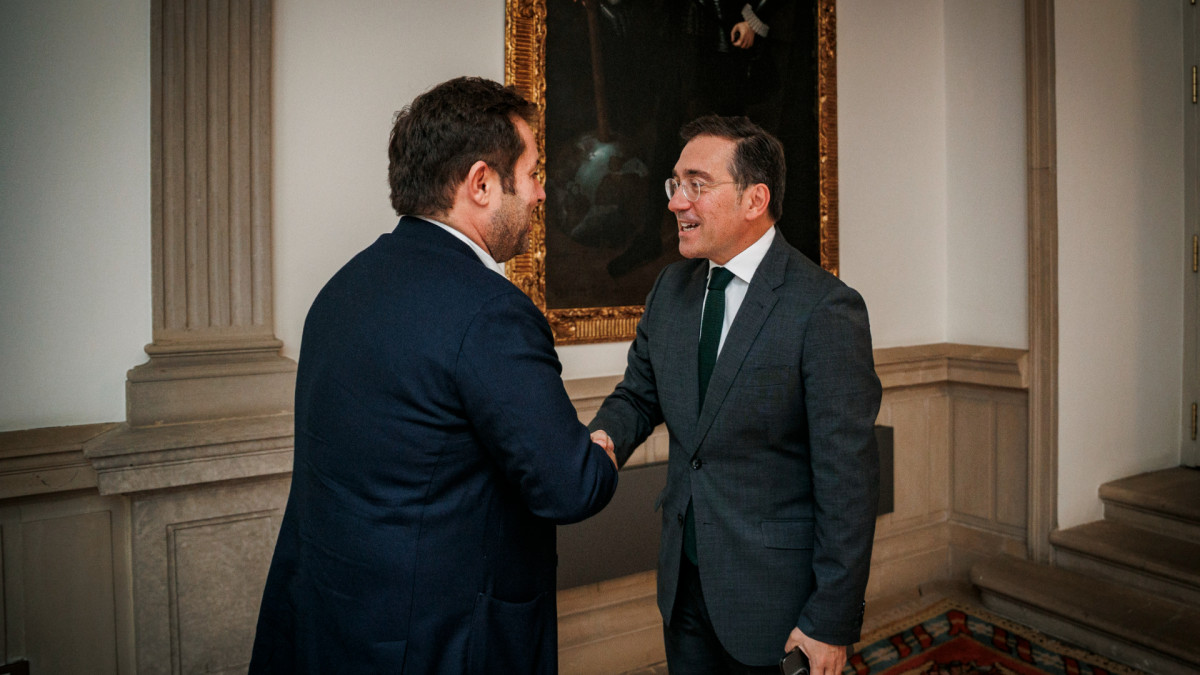
López Plana and Albares parted ways after an engaging conversation. Photo: Agenda Pública / Tania Sieira
